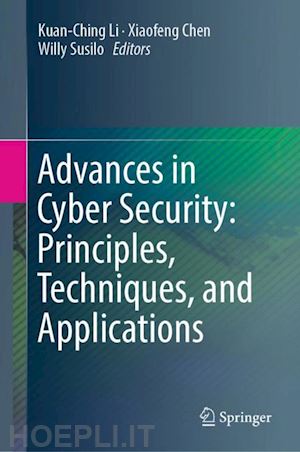
Questo prodotto usufruisce delle SPEDIZIONI GRATIS
selezionando l'opzione Corriere Veloce in fase di ordine.
Pagabile anche con Carta della cultura giovani e del merito, 18App Bonus Cultura e Carta del Docente
This book provides state-of-the-art coverage of the principles, techniques, and management of issues in cyber security, including threat attacks, privacy, signature and encryption schemes. One of the most important topics addressed concerns lightweight solutions for public key encryption in resource-constrained environments; the book highlights the latest developments in this area. Authentication is another central issue in cyber security. In this book, we address this aspect and sub-aspects ranging from cryptographic approaches to practical design issues, such as CAPTCHA. Privacy is another main topic that is discussed in detail, from techniques for enhancing privacy to pseudonymous schemes.
Addressing key issues in the emerging field of cyber security, this book effectively bridges the gap between computer security and threat attacks, and showcases promising applications involving cryptography and security.
Kuan-Ching Li is a Professor of Computer Science and Engineering at Providence University, Taiwan. He is a recipient of guest and distinguished chair professorships from universities in China and other countries, and awards and funding support from a number of agencies and industrial companies. He has been actively involved in many major conferences and workshops in program/general/steering conference chairman positions, and has organized numerous conferences on high-performance computing and computational science and engineering. He is a fellow of the IET, senior member of the IEEE and a member of the AAAS; in addition, he is Editor-in-Chief of the International Journal of Computational Science and Engineering (IJCSE), International Journal of Embedded Systems (IJES), and International Journal of High Performance Computing and Networking (IJHPCN). Besides publishing numerous research papers, he is the co-author/co-editor of several technical professional books published by CRC Press, Springer, McGraw-Hill and IGI Global. His research interests include GPU/many-core computing, Big Data, Smart Grids and Cloud.
Xiaofeng Chen works at Xidian University as a professor. His research interests include applied cryptography and cloud computing security. He has published over 200 research papers in refereed international conferences and journals. He serves on the editorial board of Security and Communication Networks (SCN), Telecommunication Systems (TELS), and Computing and Informatics (CAI), and as an Associate Editor for the International Journal of High Performance Computing and Networking (IJHPCN). He served as general chair of the 11th ACM Asia Conference on Computer and Communications Security (AsiaCCS 2016) and as program co-chair of the 5th International Conference on Provable Security (ProvSec 2011). Currently, he is a director of the Information Security Center, State Key Laboratory of Integrated Service Networks (ISN), Xidian University, China.
Willy Susilo is a Professor at the School of Computing and Information Technology and director of the Institute of Cybersecurity and Cryptology (iC2) at the University of Wollongong. His main research interests include cryptography and cybersecurity. He received a prestigious ARC Future Fellowship from the Australian Research Council. He also received the UOW Researcher Award (2016) in recognition of his research excellence. He has served as an Associate Editor for numerous international journals, such as IEEE Transactions in Information Forensics and Security, and the International Journal of Information Security.











Il sito utilizza cookie ed altri strumenti di tracciamento che raccolgono informazioni dal dispositivo dell’utente. Oltre ai cookie tecnici ed analitici aggregati, strettamente necessari per il funzionamento di questo sito web, previo consenso dell’utente possono essere installati cookie di profilazione e marketing e cookie dei social media. Cliccando su “Accetto tutti i cookie” saranno attivate tutte le categorie di cookie. Per accettare solo deterninate categorie di cookie, cliccare invece su “Impostazioni cookie”. Chiudendo il banner o continuando a navigare saranno installati solo cookie tecnici. Per maggiori dettagli, consultare la Cookie Policy.